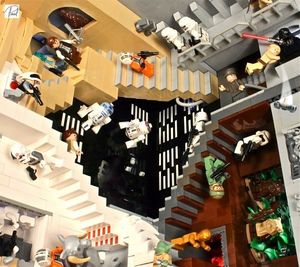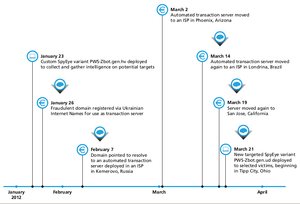Difference between revisions of "Blog"
m |
|||
| Line 1: | Line 1: | ||
| − | {{ | + | {{lowercase}}{{Subscribe|{{REQUEST:category|}}}} |
{{#ask:[[Category:{{REQUEST:category|News}}]] | {{#ask:[[Category:{{REQUEST:category|News}}]] | ||
| ?Creation date | | ?Creation date | ||
Revision as of 20:11, 27 July 2013
23 July 2014 |
| Posted by Nad on 23 July 2014 at 21:41 |
|---|
This post has the following tags : News
|
|
Ethereum Genesis Sale starts today!Ethereum is a new crypto-currency that has been under development for the last couple of years lead by Vitalik Buterin. Ethereum is not just another "alt coin" though, it really is the next generation of this paradigm, taking it out of the basic currency role by offering full-scale general purpose distributed application development and testing framework. Ethereum does still have an associated currency aspect called "Ether" (ETH) which performs the important role of "fuel" in the Ethereum network. Distributed applications in the Ethereum network require payments in the form of Ether to fuel every computational step and storage operation on the system.Bitcoin and Litecoin are often thought of as the gold and silver of the crypto-currencies. To continue with that analogy, Ethereum could be considered as the "oil" of crypto-currency since it plays the role of fuel which can be used for any generic application. Another interesting and important aspect is that Ethereum could help to pave the way towards how a real-world resource-based economy might be implemented, which seems to be the only viable way to transcend the economic bottom-line problem. Yesterday was a special day for the Ethereum community because the so-called "Genesis Sale" of Ether began. The Genesis Sale is a forty two day period in which Ether is being made available in exchange for bitcoin starting at a rate of 2000 ETH per BTC for the first two weeks and then reducing by 30 ETH each day after that. Ethers are purchased from the Ethereum home page at www.ethereum.org. All the BTC accepted by the organisation for he purchase of Ethers are deposited into a single bitcoin address so that people can easily see how much has been bought so far here. As I write this about twenty hours into the sale over five thousand BTC worth has already been purchased which is over three million US dollars! See also:
|
9 April 2014 |
| Posted by Nad on 09 April 2014 at 00:34 |
|---|
This post has the following tags : News
|
|
Critical bug named "Heartbleed" found in OpenSSLOn April 7, 2014, it was announced that all versions of OpenSSL in the 1.0.1 series up to and including 1.0.1f had a severe memory handling error in their implementation of the TLS Heartbeat Extension. This error could be used to reveal up to 64 kilobytes of the application's memory. The vulnerability had existed since December 31, 2011, and had been adopted to widespread use since the release of the OpenSSL version 1.0.1 on March 14, 2012. By reading the memory of the SSL server, attackers could access sensitive data, compromising the security of the server and its users. Potentially vulnerable secure data include the server's private master key, which enables attackers to break the encryption of the server's earlier eavesdropped communications and impersonate as the server. The vulnerability might also reveal unencrypted parts of other user's sensitive requests and responses, including session cookies and passwords, which might allow attackers to hijack the identity of another user of the service. At its disclosure, some 17% or half a million of the Internet's secure web servers certified by trusted authorities were believed to have been vulnerable to the attack. [more...]. The warning about the bug in OpenSSL coincided with the release of version 1.0.1g of the open-source program, which is the default cryptographic library used in the Apache and nginx Web server applications, as well as a wide variety of operating systems and e-mail and instant-messaging clients. The bug, which has resided in production versions of OpenSSL for more than two years, could make it possible for people to recover the private encryption key at the heart of the digital certificates used to authenticate Internet servers and to encrypt data traveling between them and end users. Attacks leave no traces in server logs, so there's no way of knowing if the bug has been actively exploited. Still, the risk is extraordinary, given the ability to disclose keys, passwords, and other credentials that could be used in future compromises. [more...] Here at Organic Design we have suffered from this flaw since 1 July 2013 when we upgraded from Debian 6 to Debian 7. Luckily we've been using Perfect Forward Secrecy since then which means that only live man-in-the-middle attacks would have been able to reveal any information, but changing passwords and certificates is still best done to be on the safe side. We upgraded the OS yesterday which implemented this security patch. See also: |
28 January 2014 |
| Posted by Nad on 28 January 2014 at 15:40 |
|---|
This post has the following tags : News
|
|
MaidSafe claims to have built a Bitcloud-like systemSource: wired.co.uk One of the great things about the architecture of the internet is that it is truly decentralised. By design, no one rules it and everyone can use it. But in the last two decades, a small collection of global technology companies have come to control the bulk of internet traffic. Google, Facebook, and others have captured our attention and with it, our data. In the face of such consolidation, concerns about the implications for personal privacy and security have never been more pressing. This is particularly the case following the NSA/GCHQ global surveillance revelations. For many, the solution to this situation is to return the internet to its original state -- distributed, open, and decentralised.It is certainly not the first time that the idea of a peer-to-peer redesign of the whole internet has been vaunted, and it holds great appeal to those who think end-to-end encryption is needed. But such a system, workable at scale, is still just a thought experiment. Or is it? A Scottish company, MaidSafe, claims that it has nearly finished building a system that does what Bitcloud is proposing. You can imagine our scepticism when a company we've never heard of, in the tiny town of Troon, with a terrible name and a 12-minute promotional video told me it had solved one of the most compelling problems on the internet. [more...] |
20 August 2013 |
| Posted by Nad on 19 August 2013 at 22:15 |
|---|
This post has the following tags : News
|
|
Bitmessage gateway up and runningBitmessage is a peer-to-peer communications protocol based on the Bitcoin crypto-currency used to send encrypted messages to another person or to many subscribers. It is decentralized and trustless, meaning that you need-not inherently trust any entities like root certificate authorities. It uses strong authentication which means that the sender of a message cannot be spoofed, and it aims to hide "non-content" data, like the sender and receiver of messages, from passive eavesdroppers like those running warrantless wiretapping programs.We've now set up a Bitmessage gateway on the Organic Design server which means that existing mail users can now transparently send and receive messages in the Betmessage network. The security of the system is less working in this way since the connection to the Organic Design mail server is a normal SSL connection, but it's still very useful since most users would not be willing to set up a completely new communications application to use Bitmessage, so it helps to get the system more utilised. Users who start working more seriously with it later can take their existing address from the Organic Design gateway and use it in their local Bitmessage client. More detail about the gateway script and usage can be found in our local Bitmessage article. See also: |
14 July 2013 |
| Posted by Nad on 14 July 2013 at 23:11 |
|---|
This post has the following tags : News
|
|
Wikimedia starts a major new workflow frameworkError creating thumbnail: Unable to save thumbnail to destination Of particular interest to us here at Organic Design is the incorporation into Flow of a "Workflow Description Language" module which can potentially encapsulate all the systems from discussion and notification mechanisms up to large-scale project workflow scenarios. This is the kind of thing we were trying to head towards with our Wiki Organisation system. For more information, see the Flow Portal. |
11 July 2013 |
| Posted by Nad on 11 July 2013 at 16:08 |
|---|
This post has the following tags : News
|
|
The first step towards migrating to GitEventually we'd like to migrate our code repositories over completely from Subversion to Git since Git is much more in line with our philosophy being peer-to-peer instead of centralised. A full migration is a big process though - the Wikimedia foundation took well over a year of discussions and testing to achieve this migration.But after the recent migration we made on our web-server from Apache to Nginx, we were left with the problem of anonymous users no longer being able to checkout local read-only copies of our code over HTTP since it relies on a module which isn't available for Nginx. We set up a Guest RSA key so that users could still do this over SSH, but this is a very complicated process for the average user and is a complete nightmare for Windows users. So we took this problem as an opportunity to take the first step on the Git-migration journey! I found a very useful script by Daniel Pocock here which allows a read-only Git mirror to be maintained automatically from your Subversion repositories. This means anonymous users can easily access and use our public code while we still continue working with our local Subversion repositories without requiring any changes to our procedures :-) Our GitHub mirror is at github.com/OrganicDesign and I documented my procedure for setting the script up here. |
19 June 2013 |
| Posted by Nad on 19 June 2013 at 00:20 |
|---|
This post has the following tags : News
|
|
Boycott Ubuntu!We've been using Debian for our server operating system of choice for over ten years now, but I've recently decided to change from Ubuntu to Debian for our workstations as well now since Ubuntu is increasingly becoming the "microsoft of the free software world" with pay software and services at every corner and compulsory spyware riddled throughout system.I was very dissapointed with the change of the desktop environment to Unity as well which I really can't stand, but the spyware is a real show-stopper for me so it's time for a change. Some other choices I've looked into which look really good are Linux Mint which currently holds the number one position in popularity of Linux distributions, Mageia which is number two, and gNewSense which has the strongest libre-oriented focus.
|
27 September 2012 |
| Posted by Nad on 27 September 2012 at 21:03 |
|---|
This post has the following tags : News
|
|
Site upgradeError creating thumbnail: Unable to save thumbnail to destination |
10 July 2012 |
| Posted by Nad on 10 July 2012 at 22:37 |
|---|
This post has the following tags : News
|
|
Coolest Lego construction ever!Six months in the making, 16-year-old Paul Vermeesch presents his largest creation to date: a 1x1x1 foot model of M.C. Escher's print "Relativity" reenacted in the Lego Star Wars theme. A far larger, cleaner, and more detailed rehashing of his 2010 version, this diorama is fully lit from the inside, presents the original Star Wars trilogy in a roughly counter-clockwise format, and even features a minifig-scale theatre in the back which plays Lego's CG version of the Star Wars saga. Enjoy!See also: |
26 June 2012 |
| Posted by Nad on 01 July 2012 at 12:48 |
|---|
This post has the following tags : News
|
|
Huge Worldwide Cyber Bank Raid OngoingSky News has just reported that a huge worldwide cyber bank raid is ongoing - €60 million have been confirmed stolen through 1 server, and a total of €2 billion is estimated to have been stolen through an additional 59 servers! This attack has been ongoing since the beginning of the year, but has possibly gone unreported to avoid bank-runs.The original version of the fraudulent system is a variant of the Zeus/SpyEye trojans which have been circulating for a year or so phishing for information from the many customers who are silly enough to be using the Microsoft Windows operating system and then logging in to their bank accounts and transferring their money out. This new system however is far more sophisticated and can now operate in many cases from it's own servers rather than from compromised client computers. I think this huge fraud could well be used (and even funded) by the elite to avoid responsibility for the financial collapse. They can now blame this virus for the collapse saying they were making good progress getting things back on track - when in reality the entire system is being propped up by derivatives and is in the process of total and unavoidable collapse. See also: |













